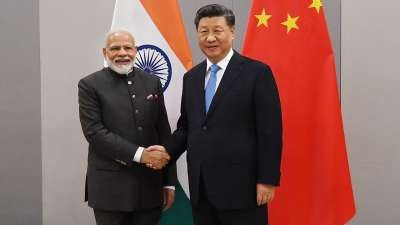At the 16th BRICS Summit in Kazan, Russia, Prime Minister Narendra Modi was seen giving a thumbs-up as he sat alongside Russian President Vladimir Putin and Chinese President Xi Jinping during an informal dinner. This moment of camaraderie among the leaders comes after India and China reached an agreement on patrolling arrangements at the Line of Actual Control (LAC), marking a significant step towards resolving their military standoff.
The dinner included a concert, and the interactions highlighted the strengthening ties between China and Russia, particularly in the wake of Russia’s ongoing conflict in Ukraine. Notably, Putin greeted Modi with both a handshake and a hug, reflecting their close relationship.
Modi and Xi are scheduled to hold a bilateral meeting on the sidelines of the summit, according to Foreign Secretary Vikram Misri, signaling a breakthrough in the prolonged military tensions between the two nations.
Relations between India and China had deteriorated significantly after the violent clash in the Galwan Valley in June 2020, marking the most serious military conflict between them in decades. However, the seating arrangement at the BRICS dinner, with Putin positioned between Modi and Xi, suggests a shift towards closer diplomatic ties among the three countries.
Modi and Xi’s last structured meeting occurred during their informal summit in Mamallapuram in October 2019, just before the border standoff began. The recent agreement on patrolling along the LAC resulted from extensive diplomatic and military discussions, following multiple meetings between senior leaders in recent months. Notably, External Affairs Minister S. Jaishankar met with Chinese Foreign Minister Wang Yi at the Shanghai Cooperation Organisation (SCO) Summit in July and during ASEAN-related meetings in late July. Additionally, National Security Adviser Ajit Doval met Wang during a BRICS gathering in St. Petersburg in September.






















